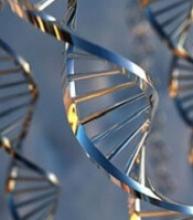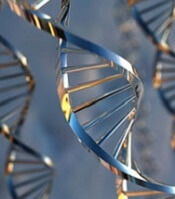User login
CHICAGO—While 67% of newly diagnosed patients with acute myeloid leukemia (AML) receive some genetic testing, only 9% receive all 7 of the genetic tests recommended by the National Comprehensive Cancer Network (NCCN), according to new research.
The data comes from the CONNECT MDS/AML Disease Registry, which collects treatment and outcome statistics from 86 sites across the United States, both academic medical centers and community settings. The findings reflect data gathered from 2013 to 2016.
Previously, data on genetic testing in AML patients came primarily from clinical trials, where adherence to guidelines is very high. The current analysis evaluated adherence to genetic testing guidelines in AML treated outside the clinic trial setting.
Daniel A. Pollyea, MD, of the University of Colorado Comprehensive Cancer Center in Aurora, presented the findings on behalf of the CONNECT MDS/AML Disease Registry Scientific Steering Committee (abstract 7022).
The CONNECT registry is a US prospective, observational cohort study of patients with newly diagnosed AML or myelodysplastic syndromes (MDS) aged 55 years or older. Enrollment is ongoing and study clinicians make all clinical decisions.
NCCN guidelines recommend testing AML patients for NPM1, FLT3-ITD, CEBPA, IDH1, IDH2, DNMT3A, and KIT mutations.
“We now know a tremendous amount about the genetic underpinnings of the disease,” Dr Pollyea said.
“We can test for these genetic changes in the clinic to see what’s making a patient’s disease tick. And often there are targeted therapies that can be matched with these genetic changes," he added. "But there’s a disconnect between what can be done, what should be done, and what is being done.”
The current analysis evaluated genetic testing in 259 AML patients, 173 (67%) of whom had some genetic testing.
The likelihood of patients getting tested varied by type of treatment center, age, karyotype, and insurance.
Patients treated at academic medical centers had higher rates of testing than those treated at community clinics (76% and 62%, respectively), P= 0.018
Patients younger than 65 years more often were tested than older patients (83% and 60%, respectively), P= 0.0003.
Patients with non-Medicare insurance were more often tested than those with Medicare (74% and 61%, respectively), P= .025.
And patients with normal karyotype were more often tested than those with abnormal karyotype (77% and 59%, respectively), P= 0.006.
Of the 173 patients who had some genetic testing, only 15 (9%) had all the molecular tests recommended by NCCN.
Of the 7 recommended tests, NPM1 (77%) and FLT3-ITD (76%) were most often reported and DNMT3A least often (16%).
Dr Pollyea attributed the lack of adherence to the guidelines in part to willingness of insurance companies to pay for testing.
He also suggested the guidelines themselves might need adjustment, given the low adherence rate.
Nevertheless, he affirmed the guidelines are well founded. “I think the guidelines are pretty solid and, in my opinion, I would say they don’t go far enough in recommending genetic testing.”
“We’re in our infancy with this testing, and even earlier than infancy in seeing how we’re doing on testing. But now with this registry we at least have the infrastructure available to ask these kinds of questions,” Dr Pollyea added. ![]()
CHICAGO—While 67% of newly diagnosed patients with acute myeloid leukemia (AML) receive some genetic testing, only 9% receive all 7 of the genetic tests recommended by the National Comprehensive Cancer Network (NCCN), according to new research.
The data comes from the CONNECT MDS/AML Disease Registry, which collects treatment and outcome statistics from 86 sites across the United States, both academic medical centers and community settings. The findings reflect data gathered from 2013 to 2016.
Previously, data on genetic testing in AML patients came primarily from clinical trials, where adherence to guidelines is very high. The current analysis evaluated adherence to genetic testing guidelines in AML treated outside the clinic trial setting.
Daniel A. Pollyea, MD, of the University of Colorado Comprehensive Cancer Center in Aurora, presented the findings on behalf of the CONNECT MDS/AML Disease Registry Scientific Steering Committee (abstract 7022).
The CONNECT registry is a US prospective, observational cohort study of patients with newly diagnosed AML or myelodysplastic syndromes (MDS) aged 55 years or older. Enrollment is ongoing and study clinicians make all clinical decisions.
NCCN guidelines recommend testing AML patients for NPM1, FLT3-ITD, CEBPA, IDH1, IDH2, DNMT3A, and KIT mutations.
“We now know a tremendous amount about the genetic underpinnings of the disease,” Dr Pollyea said.
“We can test for these genetic changes in the clinic to see what’s making a patient’s disease tick. And often there are targeted therapies that can be matched with these genetic changes," he added. "But there’s a disconnect between what can be done, what should be done, and what is being done.”
The current analysis evaluated genetic testing in 259 AML patients, 173 (67%) of whom had some genetic testing.
The likelihood of patients getting tested varied by type of treatment center, age, karyotype, and insurance.
Patients treated at academic medical centers had higher rates of testing than those treated at community clinics (76% and 62%, respectively), P= 0.018
Patients younger than 65 years more often were tested than older patients (83% and 60%, respectively), P= 0.0003.
Patients with non-Medicare insurance were more often tested than those with Medicare (74% and 61%, respectively), P= .025.
And patients with normal karyotype were more often tested than those with abnormal karyotype (77% and 59%, respectively), P= 0.006.
Of the 173 patients who had some genetic testing, only 15 (9%) had all the molecular tests recommended by NCCN.
Of the 7 recommended tests, NPM1 (77%) and FLT3-ITD (76%) were most often reported and DNMT3A least often (16%).
Dr Pollyea attributed the lack of adherence to the guidelines in part to willingness of insurance companies to pay for testing.
He also suggested the guidelines themselves might need adjustment, given the low adherence rate.
Nevertheless, he affirmed the guidelines are well founded. “I think the guidelines are pretty solid and, in my opinion, I would say they don’t go far enough in recommending genetic testing.”
“We’re in our infancy with this testing, and even earlier than infancy in seeing how we’re doing on testing. But now with this registry we at least have the infrastructure available to ask these kinds of questions,” Dr Pollyea added. ![]()
CHICAGO—While 67% of newly diagnosed patients with acute myeloid leukemia (AML) receive some genetic testing, only 9% receive all 7 of the genetic tests recommended by the National Comprehensive Cancer Network (NCCN), according to new research.
The data comes from the CONNECT MDS/AML Disease Registry, which collects treatment and outcome statistics from 86 sites across the United States, both academic medical centers and community settings. The findings reflect data gathered from 2013 to 2016.
Previously, data on genetic testing in AML patients came primarily from clinical trials, where adherence to guidelines is very high. The current analysis evaluated adherence to genetic testing guidelines in AML treated outside the clinic trial setting.
Daniel A. Pollyea, MD, of the University of Colorado Comprehensive Cancer Center in Aurora, presented the findings on behalf of the CONNECT MDS/AML Disease Registry Scientific Steering Committee (abstract 7022).
The CONNECT registry is a US prospective, observational cohort study of patients with newly diagnosed AML or myelodysplastic syndromes (MDS) aged 55 years or older. Enrollment is ongoing and study clinicians make all clinical decisions.
NCCN guidelines recommend testing AML patients for NPM1, FLT3-ITD, CEBPA, IDH1, IDH2, DNMT3A, and KIT mutations.
“We now know a tremendous amount about the genetic underpinnings of the disease,” Dr Pollyea said.
“We can test for these genetic changes in the clinic to see what’s making a patient’s disease tick. And often there are targeted therapies that can be matched with these genetic changes," he added. "But there’s a disconnect between what can be done, what should be done, and what is being done.”
The current analysis evaluated genetic testing in 259 AML patients, 173 (67%) of whom had some genetic testing.
The likelihood of patients getting tested varied by type of treatment center, age, karyotype, and insurance.
Patients treated at academic medical centers had higher rates of testing than those treated at community clinics (76% and 62%, respectively), P= 0.018
Patients younger than 65 years more often were tested than older patients (83% and 60%, respectively), P= 0.0003.
Patients with non-Medicare insurance were more often tested than those with Medicare (74% and 61%, respectively), P= .025.
And patients with normal karyotype were more often tested than those with abnormal karyotype (77% and 59%, respectively), P= 0.006.
Of the 173 patients who had some genetic testing, only 15 (9%) had all the molecular tests recommended by NCCN.
Of the 7 recommended tests, NPM1 (77%) and FLT3-ITD (76%) were most often reported and DNMT3A least often (16%).
Dr Pollyea attributed the lack of adherence to the guidelines in part to willingness of insurance companies to pay for testing.
He also suggested the guidelines themselves might need adjustment, given the low adherence rate.
Nevertheless, he affirmed the guidelines are well founded. “I think the guidelines are pretty solid and, in my opinion, I would say they don’t go far enough in recommending genetic testing.”
“We’re in our infancy with this testing, and even earlier than infancy in seeing how we’re doing on testing. But now with this registry we at least have the infrastructure available to ask these kinds of questions,” Dr Pollyea added. ![]()

